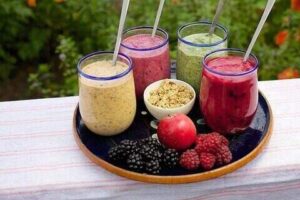Juicing has become increasingly popular in recent years as a way to improve overall health and well-being. Not only can juicing help you consume more fruits and vegetables, there are also many specific health benefits of juicing.
In this article, we will explore some of the specific health benefits of juicing.
-
Boosts Immune System
Juicing is an excellent way to boost your immune system. Fruits and vegetables are packed with vitamins and minerals that help your body fight off infections and diseases.
Some fruits and vegetables, such as oranges, grapefruits, and strawberries, are particularly rich in vitamin C, which is essential for immune system function. Juicing these fruits and vegetables can help you consume more vitamin C and other immune-boosting nutrients.
-
Promotes Weight Loss
Juicing can be an effective tool for weight loss. Fruits and vegetables are low in calories and high in fiber, which can help you feel full and satisfied while consuming fewer calories.
Juicing also helps you avoid processed foods that are often high in calories and low in nutrients. Additionally, drinking juice can help reduce cravings for unhealthy snacks and desserts.

-
Improves Digestion
Juicing can also improve digestion. Fruits and vegetables are rich in fiber, which helps regulate bowel movements and promotes digestive health. Juicing can help you consume more fiber than you would be able to eat whole fruits and vegetables.
Maki can also help break down food more easily, making it easier for your body to absorb nutrients.
-
Detoxifies the Body
Juicing can help detoxify your body by removing toxins and waste products. Fruits and vegetables are rich in antioxidants, which help protect your body against damage from toxins and other harmful substances.
Juicing can also help flush out toxins by promoting kidney and liver function.
As you can see, there are several specific health benefits of juicing.
Here are some more.
-
Improves Skin Health
Juicing can also improve skin health. Fruits and vegetables are rich in vitamins and minerals that are essential for healthy skin. For example, vitamin C helps promote collagen production, which keeps skin firm and elastic.
Vitamin A helps prevent wrinkles and promotes cell turnover. Juicing can help you consume more of these nutrients, which can improve your skin’s appearance.

-
Reduces Inflammation
Juicing can also help reduce inflammation in the body. Chronic inflammation is linked to many health problems, including heart disease, cancer, and arthritis.
Fruits and vegetables are rich in antioxidants and other anti-inflammatory compounds that can help reduce inflammation in the body.
-
Lowers Risk of Chronic Diseases
Juicing can also help lower the risk of chronic diseases. Many fruits and vegetables are rich in nutrients that are essential for good health. For example, leafy greens are high in vitamin K, which is important for bone health.
Tomatoes are rich in lycopene, which is linked to a reduced risk of prostate cancer. By consuming more fruits and vegetables through juicing, you can help lower your risk of chronic diseases.
In a nutshell, the specific health benefits of juicing include:
- boosting the immune system,
- promoting weight loss,
- improving digestion,
- detoxifying the body,
- improving skin health,
- reducing inflammation, and
- lowering the risk of chronic diseases.
By incorporating juicing into your daily routine, you can improve your overall health and well-being.
However, it is important to remember that juicing should not be used as a replacement for whole fruits and vegetables. It is still important to consume a balanced diet that includes a variety of whole foods.
Juicing is a popular method of consuming fruits and vegetables that has been gaining popularity in recent years. It involves extracting the juice from fresh fruits and vegetables, leaving behind the pulp.
Juicing has been associated with several health benefits, including boosting immunity, detoxifying the body, and promoting weight loss.
Specific Health Benefits of Juicing

Boosts Immunity
Freshly squeezed juice is rich in vitamins, minerals, and antioxidants that help to boost the immune system. Vitamin C, for instance, is essential for the production of white blood cells, which help to fight off infections in the body.
Adding citrus fruits like oranges or lemons to your juice can give you a healthy dose of vitamin C. In addition, many other fruits and vegetables contain vitamins A, E, K, and B-complex vitamins, which also help to support the immune system.
Detoxifies the Body
Every day, our bodies are exposed to numerous toxins from the food we eat, the air we breathe, and the products we use. The liver and kidneys are responsible for removing toxins from the body.
However, they can become overwhelmed if there are too many toxins to eliminate. Juicing helps to lighten the load on these organs, allowing them to function more efficiently.
Adding vegetables like beets or leafy greens to your juice can help to support liver function and promote detoxification. These vegetables contain compounds that help to stimulate the liver and promote the elimination of toxins.
Promotes Weight Loss
Juicing can be an effective way of promoting weight loss. Juices are low in calories but high in nutrients, making them an excellent alternative to high-calorie snacks.
Additionally, the fiber in fruits and vegetables can help to keep you feeling full for longer, reducing the likelihood of overeating. Drinking a juice before a meal can also help to reduce overall calorie intake.
Juices can also be used as a meal replacement, but it is important to ensure that you are still getting all the necessary nutrients by including a variety of fruits and vegetables in your juice.
Conclusion
Juicing offers several specific health benefits, including boosting immunity, detoxifying the body, and promoting weight loss.
Incorporating fresh juices into your diet is an excellent way of ensuring that you get the recommended daily intake of vitamins and minerals. However, it is important to remember that juices should not be used as a replacement for whole fruits and vegetables, which are also important sources of fiber.
Juicing is a great way to supplement your diet, but you can’t rely solely upon it for your nutritional needs. To get the most out of juicing, experiment with different fruits and vegetables to find the combinations that work best for you.
